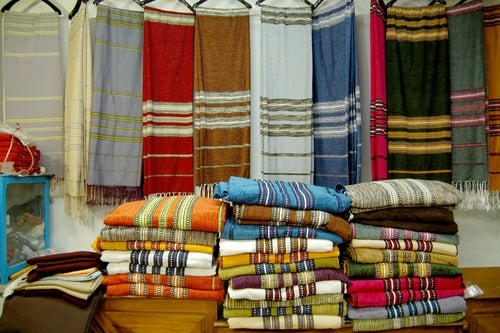
The Tunisian clothing sector wage deal was struck in November by the Tunisian Textile and Clothing Federation (FTTH), (as part of the Tunisian Union of Industry, Trade and Handicrafts – UTICA) and the General Federation of Textiles, Clothes, Leather and Shoes workers (FGTHCC), which is part of the Tunisian General Labour Union (UGTT). As a result, more than 150,000 workers in the textile and clothing sector received a 6.5% pay increase (backdated to September), with another 7% coming in May (2022).
FTTH (Fédération Tunisienne du Textile et de l’Habillement) vice president Nafaa Ennaifer said the goal was “to stabilise the purchasing power [of wages], rather than to support it or enhance it.” One reason for the move was the fact that since 2016 the Tunisian dinar currency has lost 60% of its value compared to the Euro and USD, boosting the competitiveness of exports, but making imported products more expensive for workers.
This has pushed Tunisian industrial sectors, including the mechanical and electrical sectors, to raise wages to aid recruitment, which has forced the textile and clothing sector to review its own pay: “We cannot be isolated from the decline in purchasing power and from the increases that may occur in other sectors. Therefore, in order to preserve the jobs in the sector, and to maintain its attractiveness, the textile sector finds itself obliged to update the wages,” Ennaifer tells Just Style.
Monir Hassin, board member of the Tunisian Forum for Economic and Social Rights (FTDES) agreed, telling Just Style the increase should “maintain the stability” for the industry, given the weakness of the Tunisian dinar (TND). He, however, stressed that the sewers’ average monthly wage is now TND550 (US$191.06) which is still low taking account of the high cost of living in Tunisia – so any increase would promote good industrial relations.
That said, Ennaifer warns that while larger companies (particularly in the country’s strong denim and workwear segments) may cope with the increases, smaller businesses and sub-contractors may struggle, especially as they have faced difficulties dealing with the Covid pandemic. One problem for smaller businesses is they do not have a large domestic sector to fall back on, if increased costs reduce overseas sales – Tunisia’s population is just 11.8 million. Turkish competition for sales in this market is a particular problem, he explains.
Habib Hazami, general secretary for the FGTHCC (Fédération Générale du Textile, de l’Habillement, Chaussure et Cuir) also accepts that large international enterprises would deal with the pay rise, and benefit from a more motivated workforce. As for smaller businesses, he hopes that an increase in business, through European brands, especially from Germany, France, Spain and Italy, choosing Tunisia as a near-sourcing location when diversifying sourcing as the end of the pandemic. He says the wage agreement was a positive result from “group negotiations… to guarantee balance in the textiles, clothes, leather and shoes sector.” Analysis, explanation and persuasion has “led to the conclusion that we have to apply this increase for the best interest of the sector and its workers.”

US Tariffs are shifting - will you react or anticipate?
Don’t let policy changes catch you off guard. Stay proactive with real-time data and expert analysis.
By GlobalData

